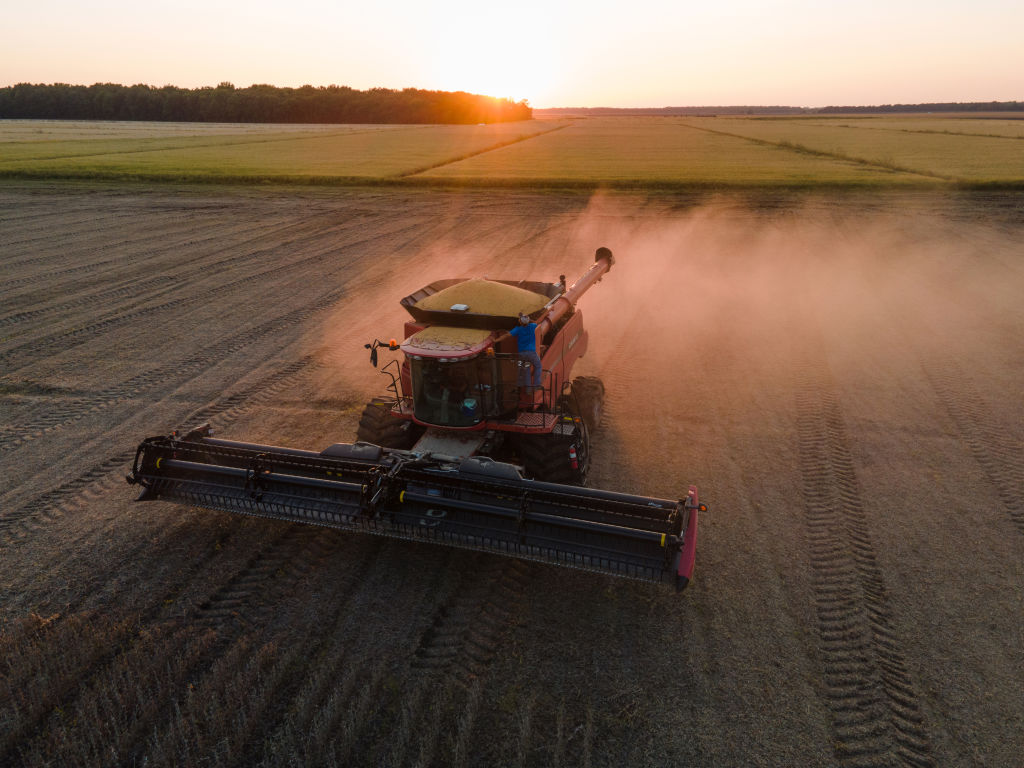
Source: Bloomberg / Getty
Black farmers are striking back at efforts to undo historic redress by the Department of Agriculture for ongoing discrimination in funding and loan forgiveness. With the support of the Lawyers’ Committee for Civil Rights Under Law, the group is seeking to join the ongoing Miller v. Vilsack lawsuit in process in the United States District Court for the Northern District of Texas.
Public Counsel and Winston & Strawn LLP, as pro-bono counsel for The Federation of Southern Cooperatives/Land Assistance Fund, also join in representing the groups. A membership network of Black farmers, landowners and cooperatives, the Federation laid out the historical discrimination in a motion to intervene as a defendant.
By joining the lawsuit, the group will be a defendant alongside USDA Secretary Tom Vilsack.
On National Farmer’s Day, learn how Black people who worked as farmers continued to face systemic barriers even after slavery ended — and still do today. pic.twitter.com/1qkYfPHeEO
— AJ+ (@ajplus) October 12, 2021
In the motion, the group asserts as one ground justifying its intervention that Vilsack does not represent the interests of Black farmers. According to the filing, the federal government maintains an interest in defending the case, the specific impact on Black farmers demands they have a seat at the table.
“The debt relief program under Section 1005 of ARPA is a substantial step toward mitigating the detrimental effects of historical and present-day disparities in USDA lending,” explained Kobi Kennedy Brinson, partner at Winston & Strawn LLP, in a statement. “Through this motion to intervene, The Federation seeks to ensure the Court considers those long-term repercussions on American farmers of color who will ultimately suffer if the plaintiffs’ campaign to thwart the debt relief program succeeds.”
The group filed a motion to intervene, not waiting for the Biden administration to defend the case or find another remedy. According to a statement released Tuesday afternoon, the group sees Section 1005 of the American Rescue Plan as a viable step toward addressing “decades of well-documented discrimination at the hands of the USDA.”
“The Federation was encouraged by the Department and Congress’s attempt to address the disproportionate impact of the debt burden that farmers of color face because of historic and ongoing race-based discrimination in agricultural credit,” said Cornelius Blanding, executive director of the Federation of Southern Cooperatives/Land Assistance Fund, in the statement. “Black farmers have always honored their commitments to their communities and our nation; our hope is that the Department will be allowed to honor its commitment to our farmers and other farmers of color.”
The Acres of Ancestry Initiative recently posted on Instagram that the USDA’s Office of Inspector General found significant issues with the agency’s handling of civil rights complaints. Notably, the inspector general’s review found the agency failed to process complaints in a timely fashion, taking an average of 799 days to process civil rights program complaints. The standard is supposed to be 180 days.
Backed by America First Legal, a post-Trump operation founded by Stephen Miller, the Texas case is one of several suits filed to derail efforts to provide past due compensation to Black farmers.
More: Conservatives Launch Lawsuits Attacking Historic Government Aid For Black Farmers
Mark Rosenbaum, Opportunity Under Law Director at Public Counsel, described the aid program as a “lifeline that is the difference between existence and extinction of the Black farmer.” The number of Black farmers has dwindled significantly in the past several decades due to the administration of federal policies and programs.
“We bring this action so that the narratives of the discrimination still confronted by those few remaining Black farmers will not be silenced and that some measure of recompense for the racism experienced not be denied to individuals who seek only equal opportunity to work their land, to provide for their families and serve all of us,” explained Rosenbaum.
Like Black people generally, Black farmers have disproportionately felt the economic burden of the COVID-19 pandemic, further compounding the ability for recovery.
“If this critical assistance is not provided soon, Black farmers and other farmers of color who have struggled to overcome decades of discrimination and the economic impacts of the global pandemic will face the threat of losing their land and their livelihoods,” said Damon Hewitt, president and executive director of the Lawyers’ Committee for Civil Rights Under Law, in a statement.
See Also:
Federal Judge Pauses Historic Funding For Black Farmers Because White Farmers Think It’s Racist
Black Farmers May Finally Get Relief With Two New Legislative Proposals
[ione_media_gallery id=”4198034″ overlay=”true”]
window.addEventListener(‘interaction’, function () {
setTimeout(function () {
var s = document.createElement(‘script’), el = document.getElementsByTagName(‘script’)[ 0 ];
s.async = true;
s.src = ‘https://platform.twitter.com/widgets.js’;
el.parentNode.insertBefore(s, el);
}, 1000)
});
